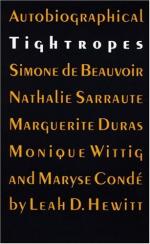|
This section contains 8,368 words (approx. 28 pages at 300 words per page) |

|
SOURCE: Writing Power in Duras' L'Amant de la Chine du nord," in College Literature, Vol. 21, No. 1, February, 1994, pp. 46-62.
In the essay below, Ramsay considers the autobiographical fiction genre and analyzes the language and structure of Duras' works.
It has been a matter of theoretical concern that "difference" or the "feminine," like the principle of "carnival" or of the disorderly woman, might remain a simple reversal of values, reversal that ultimately serves to reinforce the power structures in place. The transgression of the law—or of narrative—might simply confirm the power of the law or of the language that it transgresses.
The question of whether writing has the power to enter and recover a "wild country" of "difference" (another kind of power) through reversals or transgressions of traditional frames of reference is necessarily at the heart of any critical reading of the "new autobiographies" (L'Amant, Emily L...
|
This section contains 8,368 words (approx. 28 pages at 300 words per page) |

|


